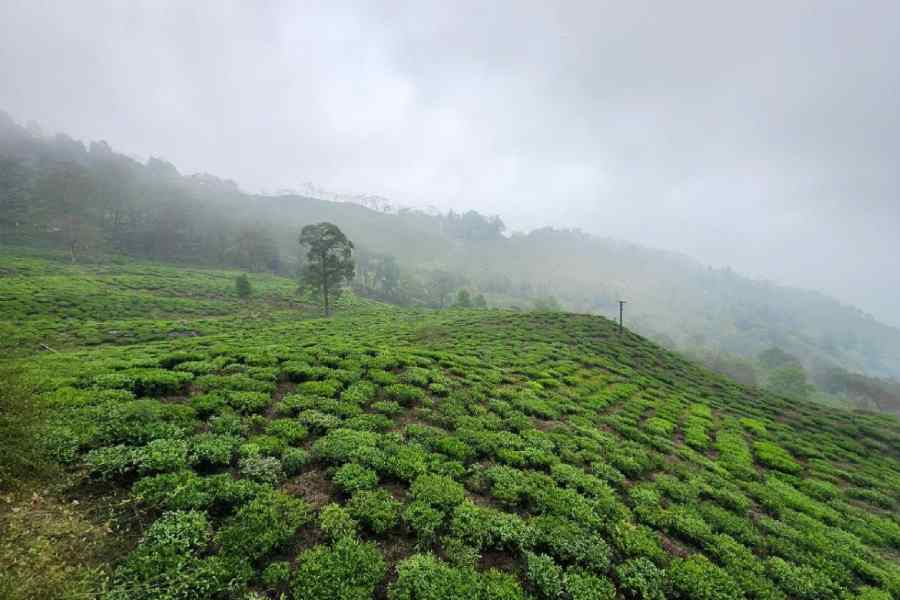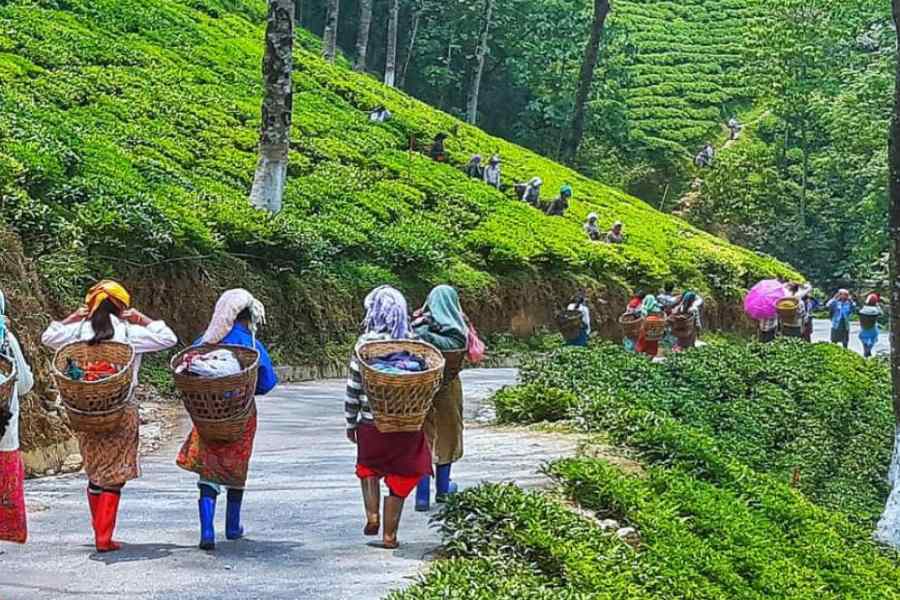A young woman, bent over slightly as she plucks the leaves, is the enduring and romantic image of tea gardens. The picture is not very pretty when looked at from close.
A recent study on the workplace safety of women in the tea gardens of north Bengal points to the deep-rooted problems faced by the women, who form the majority of tea estate workers.
According to the study, "Creating Safe Workplaces: An Engagement with Tea Gardens in West Bengal", conducted by Sanhita, a gender resource centre based in Calcutta, across 24 tea estates in Jalpaiguri, Alipurduar and Darjeeling districts, the large number of women employed as tea pluckers are particularly vulnerable in the gardens as they work at the lower levels of the hierarchy.
The prevalence or threat of sexual harassment was always present, but when the tea garden women workers spoke about it, many of them did not identify it as sexual harassment, having accepted it as normal.

Sardars (leaders) are known to overlook targets that have not been met by women in exchange for sexual favours. Sourced by The Telegraph
The study found 78 per cent of the respondents had not heard about the Sexual Harassment of Women at Workplace (Prevention, Prohibition and Redressal) Act or PoSH Act, 2013.
The study, published in 2023, was followed by a continuous engagement developed by Sanhita with tea estate workers and trade union and management representatives. The researchers have so far met about 260 women from 24 estates for the study and from 17 estates for the following ongoing interaction. For the study, 26 men, including trade union and tea garden management representatives, were interviewed.
“This was the first time the issue of sexual harassment was being raised in these tea estates,” said Soma Sen Gupta of Sanhita. “The silence that we met at first was astounding because the women did not know how to talk about it.”
The study itself was used as a tool to raise awareness, she added, and a number of incidents of harassment were reported during the study. Women spoke about the so-called “quid pro quo” arrangement.
Women and men get an equal wage of Rs 250 daily in the tea gardens, but women constitute the majority of tea estate workers. Very few men work as pluckers, in particular.
A worker is expected to pluck about 24-26kg tea leaves every day. If she fails to meet this target, money is deducted from her wages. An incentive is given for plucking extra leaves at Rs 3.50 per kg. Male sardars (leaders) oversee the work. A sardar is in charge of about 100 pluckers and there are very few female sardars. An 8-hour working day starts at 7am and continues till 5pm with a two-hour break in between.
During the daily weighing of the plucked leaves, the sardars are known to overlook targets that have not been met by women in exchange for sexual favours. Women workers were unaware that this constituted sexual harassment and that it was an unlawful and punishable offence.
They were also in denial because of the stigma attached to it, which affects the women far more than the man, especially if he is in a position of power.
“An ‘otherisation’ was noted when the women talked about incidents of sexual harassment,” said Sirsha Gupta of Sanhita, which has worked on sexual harassment in the workplace for more than two decades. “They said that such incidents happen, but not in their estate, in the next one, in another.”
Harassment occurs in other situations. “The perpetrators range from male workers, sardars and managers to administrative staff and company doctors,” says the study. Many women work as maids in estate residences.
The trade union leaders were aware of the PoSH Act, but not about the details of its provisions and requirements. The respondents were uninformed about the existence of an internal committee (IC), which the Act requires to be set up at workplaces for redress of sexual harassment, at any of the tea gardens, where they worked.
The present demands of the trade unions include revision of wages, sanction of land rights (patta) to permanent workers and the employment of more female sardars, the study said.
The management representatives stated that the women form “the backbone of the tea industry” and most of them denied the occurrence of sexual harassment in the tea gardens. One explanation offered was that it could not occur since women worked in groups.
Bengal is the second largest producer of tea in India after Assam. An estimated 3.5 lakh workers, permanent and casual, are said to be employed in the tea gardens in Bengal. Of them, more than 2 lakh are estimated to be women.
About 67 per cent of the total workers in the 24 tea gardens studied were women. This figure is higher than the official statistics of 61 per cent.
On an average there were 1,786 workers in each of the tea gardens included in the study. In these tea estates, 64 per cent were permanent and about 62 per cent of the permanent workers were women. The percentage of women among the bigha (casual) workers, engaged during the peak plucking season, was 79 per cent. In some of the gardens it went up to 90 per cent.
Bigha workers are more vulnerable as they are not covered by the Plantation Labour Act, 1951.
Women constitute 50-60 per cent of tea estate trade union members, but their presence in leadership positions remains negligible, the study found.
The women workers’ vulnerability is further compounded by their poverty, lack of education and the lack of a support system. Among the women workers coveredby the study, 66 per cent were illiterate.
The women also experience severe domestic violence. Often they live with men who are alcoholics and drug addicts. The women come to the workplace having internalised violence at home.
Single women, or women whose husbands had gone elsewhere to work, were more vulnerable to sexual harassment, the study found.
District officers (district magistrates) are responsible for monitoring the PoSH Act in their districts and have the scope to adopt proactive measures for its effective implementation in the tea gardens, given the large number of women workers engaged there, the study noted.
Two tea garden management representatives interviewed for the study said they had constituted ICs. The management considered the constitution of the IC to be adequate compliance, the study found.
“But this overlooks the other important and much larger prevention aspect of sexual harassment, such as awareness, measures towards creating a safe workplace, and the components of redress like capacity building of the IC,” Sen Gupta said.
This applies to all situations, she said. Amid the protests following the rape and murder of a doctor at RG Kar Hospital in Calcutta, “it is important to remember the role of the employer in preventing sexual harassment and creating women’s access to justice”, she added.
“It is not enough to ask if there is an IC at a workplace. Is there an environment where sexual harassment can be discussed in the first place?” Sen Gupta asked.











